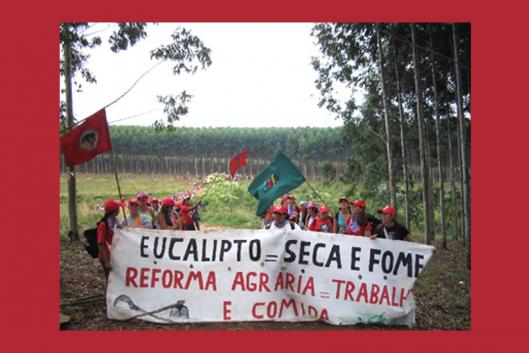In Brazil there are two conflicting models: that of the large monoculture plantations (ranging from eucalyptus, soy-beans and rice to sugar-cane), on lands held by a few large companies; and that of the peasant, indigenous and landless communities that build collective and diverse productive spaces and demand the historically promised agrarian reform.
In the framework of the week of International Women’s Day and as a way of strengthening 8 March as a day of struggle for peasant women against agri-business and in favour of the Brazilian people’s food sovereignty, 900 women, members of Via Campesina in Rio Grande do Sul (Brazil) occupied 2100 hectares of monoculture eucalyptus plantations belonging to the Swedish-Finnish transnational company, Stora Enso –the Taruma ranch, located in the municipality of Rosario do Sul (State of Rio Grande do Sul), in the frontier zone with Uruguay. The fact that Stora-Enso is the owner of these lands involves a violation of legal provisions, which prohibit the acquisition of land in frontier zones along a 150 km strip from the bordering country. Stora Enso has endeavoured to elude the regulation, purchasing land through a fictitious company, the Azenglever company, whose owners are two important company officials (1)
The occupation of this ranch by the women of Via Campesina had various objectives:
- To demand that these lands illegally acquired by Stora Enso be expropriated in favour of the Agrarian Reform.
- To demand that projects proposing a reduction of the frontier strip be withdrawn from the Senate and the Federal Chamber, as they will only lead to greater land concentration in benefit of foreign companies, while involving a threat to the ecosystems and to Brazil’s sovereignty, causing greater environmental destruction and more poverty for the people.
- To denounce the impacts of monoculture eucalyptus plantations – depletion of water sources, elimination of flora and fauna due to agrochemicals applied in the plantations – that end up by affecting peasant farming, as can be testified by the rural population of the Municipality of Encruzilhada do Sul, where Aracruz Celulose has an enormous green desert.
The action against Stora Enso was quickly repelled by repression. The Rio Grande do Sul Military Brigade used extreme violence against the 900 women and 250 children who occupied the Stora Enso plantations. Later they showed on their bodies the marks of rubber bullets, fragments of bombs and horse-hoof marks, among other atrocities.
The speed of the Rio Grande government’s reaction in support of Stora Enso may be explained by the fact that the present State Governor’s electoral campaign was partly financed (according to official data from the High Electoral Court) by the pulp companies, Aracruz, Votorantim and …Stora Enso.
However, in the midst of so much violence, the solidarity of the population of the frontier town of Santana do Livramento prevailed, guaranteeing food and medical care, lawyers contributed voluntarily to avoid greater outrages, some few parliamentarians put pressure on the federal and state governments, demanding the adoption of measures against Stora Enso and the punishment of those responsible for acts of violence against women, and number of people from different parts of the world sent messages in solidarity with the women’s struggles, in indignation over the violence.
As a response to the violence the women stepped up their commitment, expressing that for each woman who suffered violence, ten more will appear, willing to resist the death plans being carried out by companies such as Aracruz, Stora Enso (through its company Derflin) and Votorantim, in addition to the Granflor plantation company, that are planning to plant 400,000 hectares of monoculture tree plantations in the next ten years in Rio Grande do Sul.
Contrary to what happened with the peasant women, the companies did not have to face any repression in order to achieve their objectives. The result of the pressure they exerted was that on 9 April, 19 out of a total of 29 members of the Rio Grande do Sul State Environmental Council (Consema) voted in favour and adopted the much questioned Environmental Forestry Ordinance, which had been under preparation for almost three years. The original plan established limits in the State regarding the plantation of alien species – such as eucalyptus, pine and acacia. Throughout 2006 no licences were granted and only temporary authorizations were issued. In 2007 the pulp industries stepped up pressure considering that the situation was damaging to their business, arguing that the government encouraged their projects but hindered the progress of investments on refusing authorization for the planting of trees. The result was the withdrawal of the ceiling on percentages of area authorized for plantation. The decision “will compromise from 500 thousand to one million hectares of our native rural areas in one generation. When this happens, the present managers of public affairs will be dead and no one will be able to question them or make them take on their responsibilities” stated Celso Marques, a member of the Upper Council of the Gaucha Association for Protection of the Natural Environment (Agapan).
And he added “the means that the government is using to impose the interests of the major national and foreign companies trading in timber-pulp-paper, form a chain of legal and administrative irregularities. These range from a real government intervention in the state environmental body, Fepam, successively changing its directors, imposing a regime of terror with threats to the officials and effective persecution of the technicians who, safeguarding public service, were not in agreement with the government’s political impositions in the sector’s regulations, to the culmination of irregularities and legislation and ethical violations as was the adoption of the Environmental Forestry Zonation in the State Environmental Council.”
Two models are confronting and excluding each other: on one hand the Brazil of profit, of transnational corporations, of concentration that charges in with monoculture agribusiness plantations, counting on the support of power and violence. On the other, the Brazil of women, of peasants, indigenous people, defending themselves with solidarity, conviction and courage. We pay tribute to the latter.
